The John E. Marqusee Collection [1 - 50]
This page contains the first fifty medals listed in the John E. Marqusee Collection catalogue. The catalogue, authored by Susan Luftschein, is a wonderful resource for the American Art Medal collector and includes much beyond the simple list of medals. These pages simply attempt to provide a web-searchable repository for medals that are not all shown in the printed edition.
I will fill in missing medals as I acquire them or as collaborators send me quality images that I can use on the site. I would particularly appreciate images of the 19th century medals because those are outside my core area of interest and I don't expect to own most of them.

This uniface medal's obverse depicts a profile bust of Charles Pratt, r., with name and dates below.
Charles Pratt (1830-1891) was born in Watertown, Massachusetts, as one of eleven children.After initially being involved in the whale oil trade, he realized very early that petroleum could replace whale oil as a fuel for lights. He founded and grew the Astral Oil Works refinery in Brooklyn, New York and eventually merged it with J.D. Rockefeller's Standard Oil Company.
Pratt was very interested in education and founded the Pratt Institute, nowadays a highly regarded art college.
References: Marqusee 1
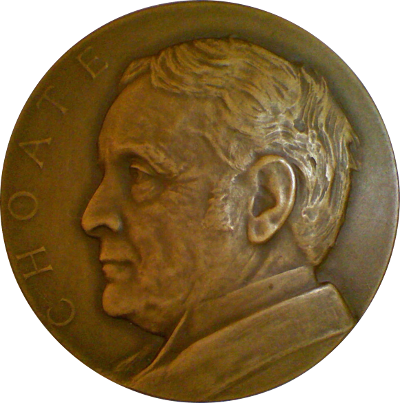
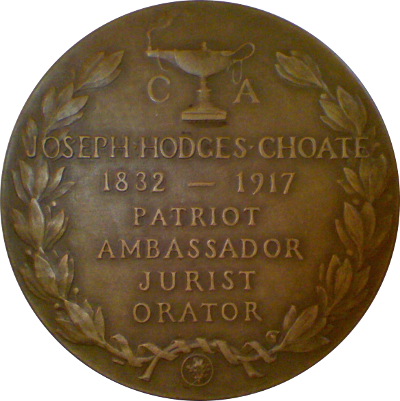
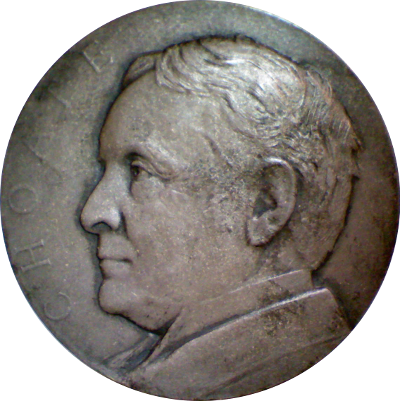
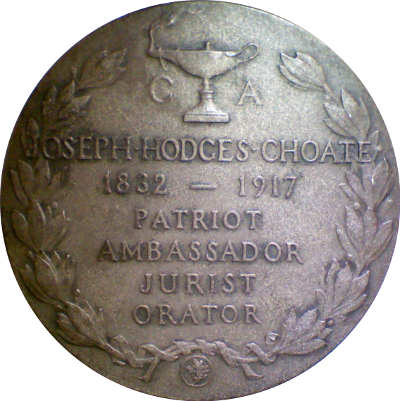
This medal was co-issued by the Century Association and the American Numismatic Society (ANS) in 1922. It was the 44th medal issued by the ANS. It was also the first in a series of medals commemorating men who distinguished themselves in public service. The obverse bears bust of Choate left. Around left edge, CHOATE; at lower right, signed H. A.
The reverse bears oil lamp of Century Association above, surrounded by C - A; circled ANS oak leaves below; laurels around. In center field, JOSEPH HODGES CHOATE / 1832 - 1917 / PATRIOT / AMBASSADOR / JURIST / ORATOR
Joseph Hodges Choate, born in Salem, Massachusetts, was a famous lawyer who litigated many of the most prominent cases in the late 19th century. He allied himself with the Republican Party and was a frequent campaign orator. In 1894 he was president of the New York State constitutional convention. In 1899 he was appointed ambassador to England by President McKinley and held that position until 1905. When World War I broke out he became a fervent supporter of the Allied cause. His death in 1917 was hastened by the physical strain of supporting the British and French commissions in New York.
Herbert Adams was a personal friend of Joseph Choate.
The medal measures 64mm (2.5in) in diameter. The Medallic Art Company of New York struck 238 pieces in bronze and 98 in silver. Originally the bronze pieces were available for $5 and the silver pieces for $10.
References: Baxter 224, Marqusee 2
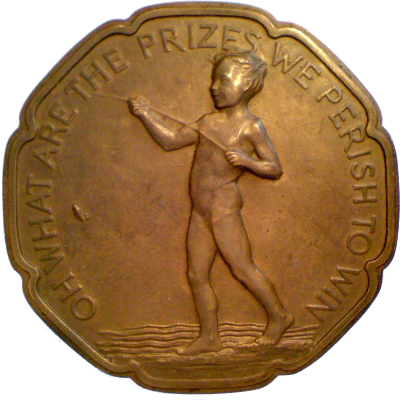
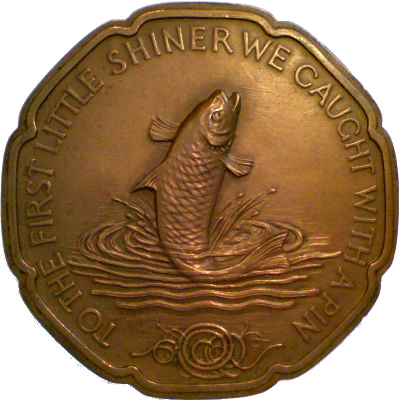
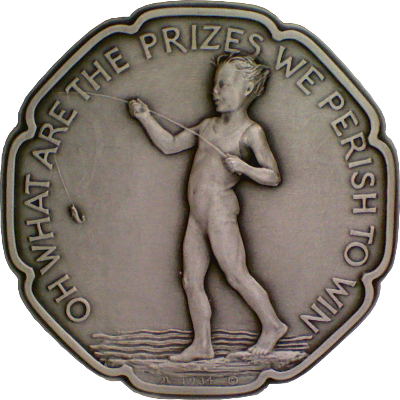
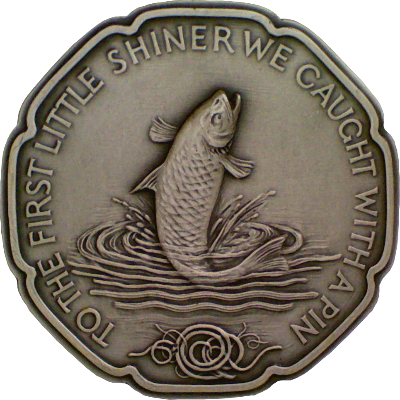
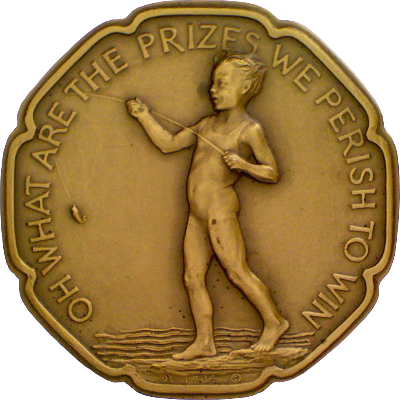
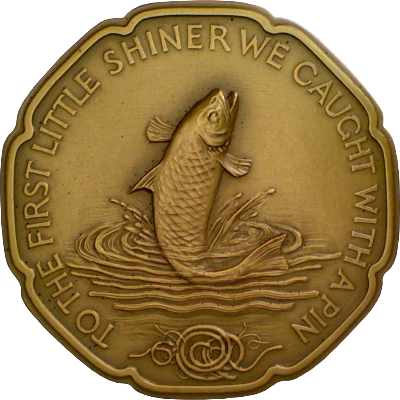
This medal was chosen as the 9th issue of the prestigious Society of Medalists series. The obverse bears a nude boy with a fishing rod who just caught a little fish and the the first half of an Oliver Wendell Holmes quotation: "OH WHAT ARE THE PRIZES WE PERISH TO WIN." The reverse bears a jumping trout with the second half of the quote: "TO THE FIRST LITTLE SHINER WE CAUGHT WITH A PIN."
In the artists own words:
"Beneath these whimsical words of the poet runs a vein of seriousness. I have not been unmindful of that undercurrent. A boy fishing is a common sight. But a boy's hopes, aspirations, struggles - these are the things that build the world's epics."
The medal measures 73mm in diameter and was produced by the Medallic Art Company of New York. The reported mintage is 1,207 pieces in bronze and 100 in silver.
References: Marqusee 3
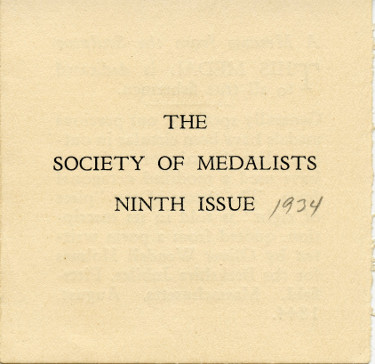
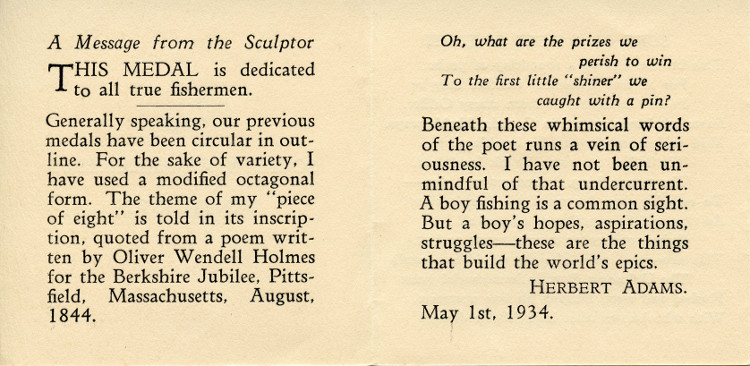
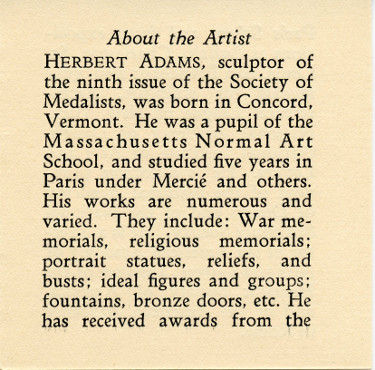
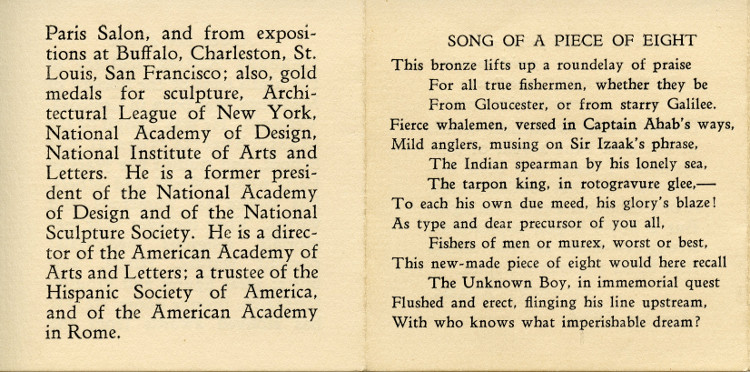
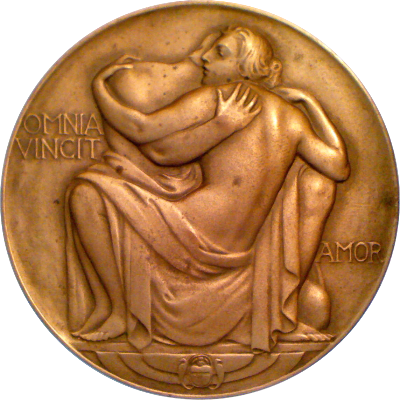
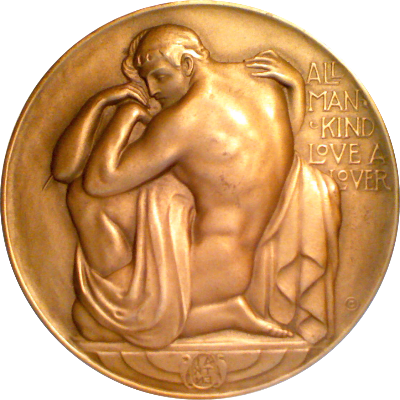
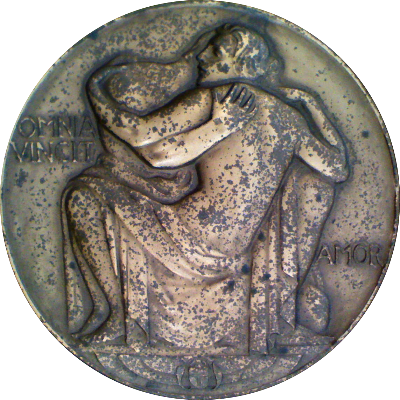
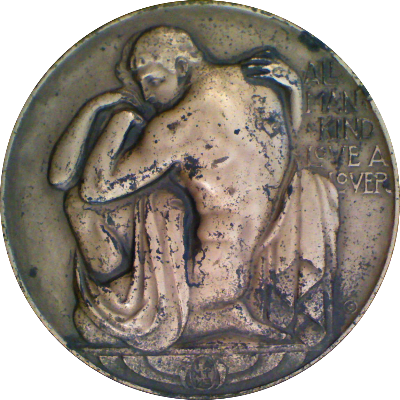
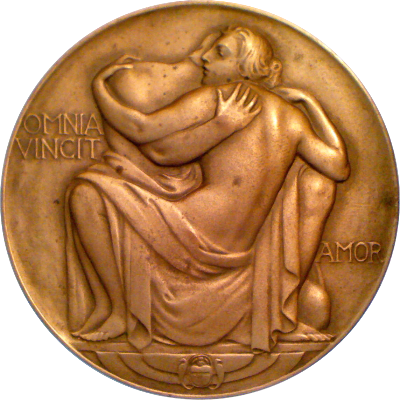
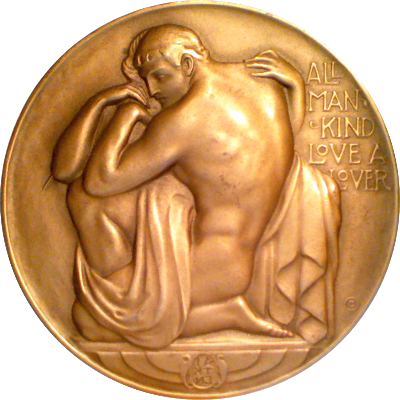
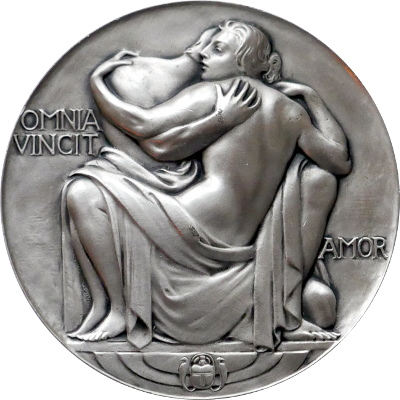
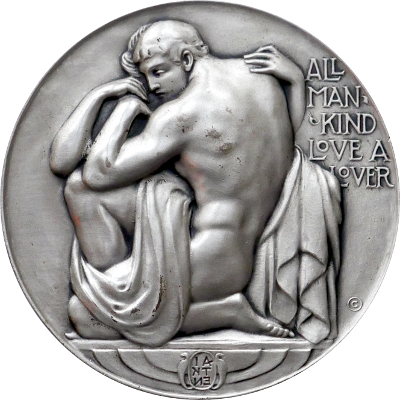
This medal was chosen as the 15th issue of the prestigious Society of Medalists series in 1937. The obverse bears an artfully draped couple embracing, woman in foreground. Legend reads OMNIA / VINCIT / AMOR (Love conquers all). The reverse bears the same couple as seen from the other side. Legend reads MAN / -KIND / LOVE A / LOVER. Signed AI /TK / EN.
The brochure which accompanied the medal had the following words from the artist:
"In making a medal or medallion the main problem is to add, if possible, to its metallic alloy the one ingredient which makes bronze imperishable - Beauty - Beauty in thought and execution. For Beauty inspires Love - Love creates Beauty."
The medal measures 73mm in diameter and 1,160 pieces were struck in bronze by the Mdallic Art Company of New York. Around 100 silver medals were struck from the same dies in the 1970s.
References: Marqusee 4
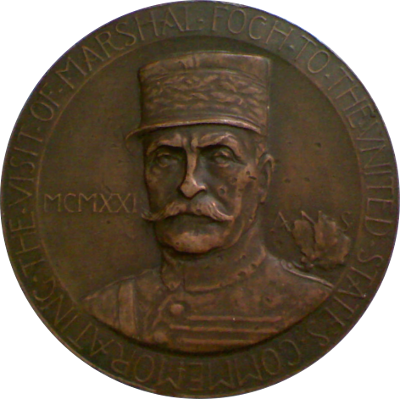
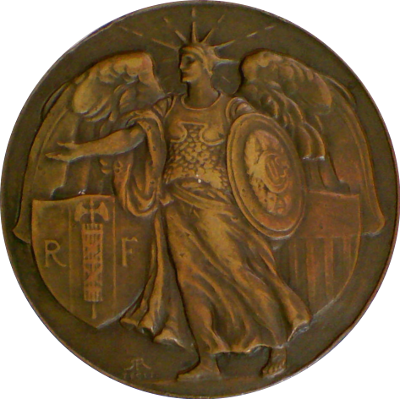
The obverse bears facing bust of Marshal Foch. Around, COMMEMORATING THE VISIT OF MARSHALL FOCH TO THE VNITED STATES; to left, MCMXXI; to right, A N S with oak leafs.
The reverse presents winged female figure holding shield, between the shields of France to the left and the United States to the right. Signed at lower left, (RA monogram ) / FECIT
Marshal Ferdinand Foch (1851-1929) was a French soldier, military theorist, and the Commander-in-Chief of the Allied forces in World War I.
The medal was issued by the American Numismatic Society (ANS) in 1921 to commemorate Foch's visit to the United States. Generals Foch and Pershing had coordinated their trips so that they would arrive more or less simultaneously, even though they were sailing on two different ships. Pershing arrived on Friday, October 28, 1921, two hours before Foch arrived on the Paris. He was given a hero's welcome by the entire city.
The medal measures 64mm in diameter and was struck by the Medallic Art Company of New York. The reported mintage is 1 piece in gold, 94 in silver, 205 in bronze and 1 piece in copper.
References: Marqusee 5

The obverse bears the P.T. Barnum museum building Above, NEW YORK; below, P.T.BARNUM / Proprietor
The reverse bears a 14 line inscription.
Allen & Moore were die-cutters and engravers from Birmingham, England. The medal measures 39mm in diameter and was struck in a white metal.
References: Marqusee 6
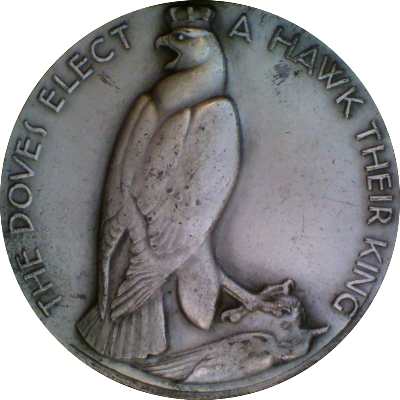
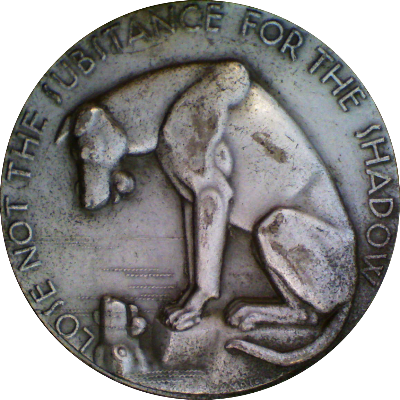
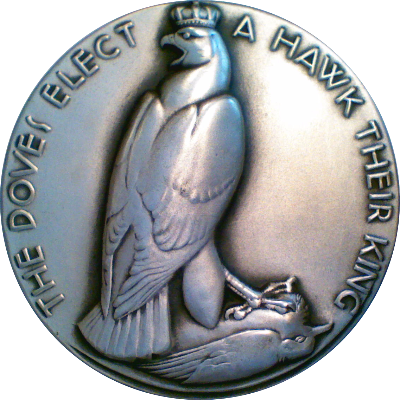
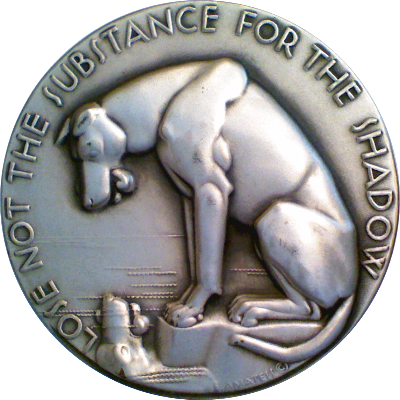
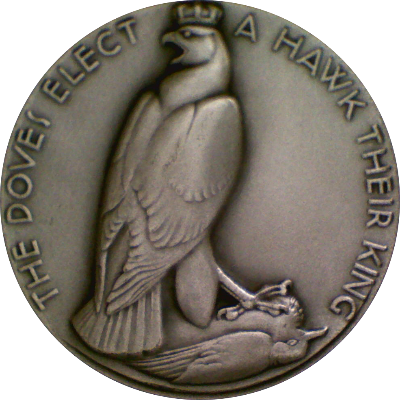
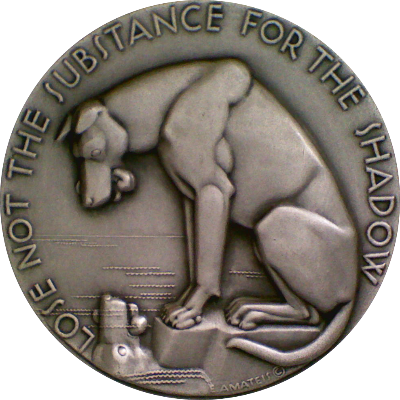
This medal was chosen as the 21st issue of the prestigious Society of Medalists series. Amateis selected the fables for "their enduring timeliness and left the interpretation up to the beholder, as best suits his sociological, political, or economic inclinations."
The two fables depicted are:
The Kite, Hawk, and Pigeons
The Pigeons find themselves persecuted by the Kite, made choice of the Hawk for their Guardian. The Hawk set up for their protector; but under the countenance of that Authority, makes more havoc in the Dovehouse in two Days than the Kite could have done in twice as many months.
The Moral
Tis a dangerous thing for People to call in a powerful and ambitious Man for their Protector; and upon the Clamour of here and there a private Person, to hazard the whole Community.
A Dog and a Shadow
As a Dog was crossing a River with a morsel of Food in his Mouth, he saw (as he thought) another Dog under the Water, upon the very same adventure. He never consider'd that the one was only the Image of the other, but out of Greediness to get both, he chops at the Shadow, and loses the Substance.
The Moral
All covet, all lose; which may serve for a Reproof to those that govern their Lives by Fancy and Appetite, without consulting the Honour and Justice of the Case.
The medal measures 73mm in diameter and has a reported mintage of 921 pieces in silver-plated bronze. Of the 700 authorized silver medals a reported 100 were struck in the 1970's.
References: Marqusee 7
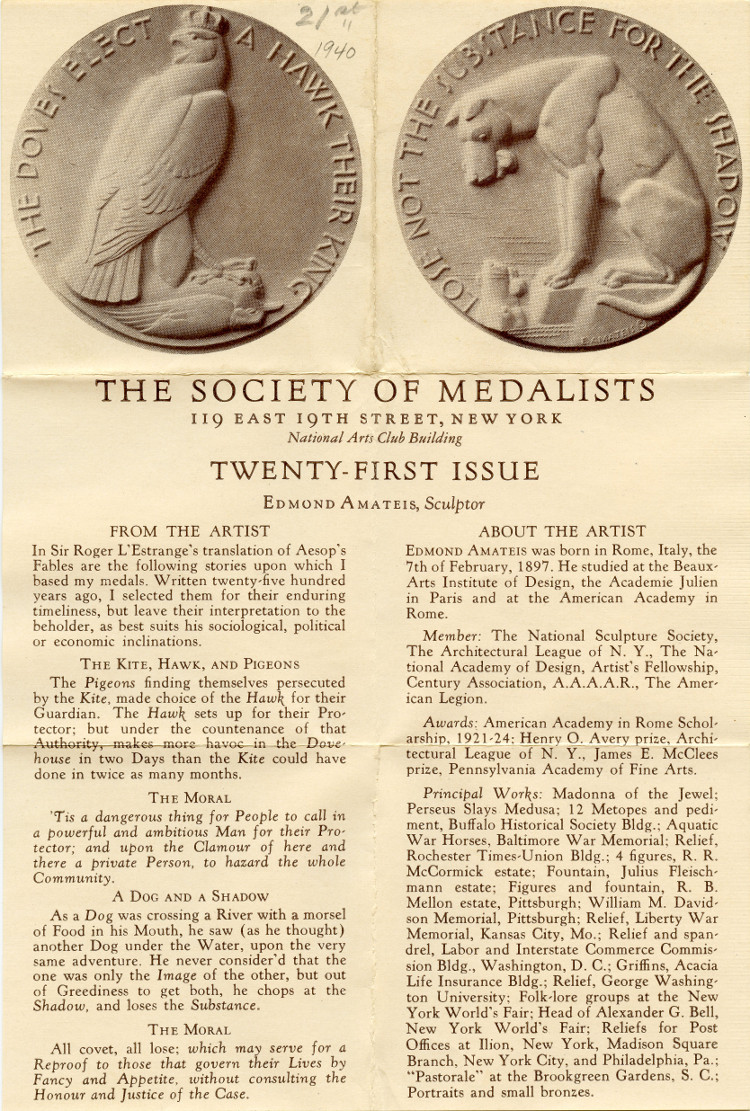


This medal's obverse bears kneeling Native American brave facing right, holding risp of orchids growing from raised ground on right. In ground at right, signed (BA monogram).
On the medal's reverse, around circumference, AMERICAN (flower) ORCHID (flower) SOCIETY; in center field, AWARDED TO / C. M. WOOLEY / FOR 100-FOOT / GROUP OF ORCHIDS. / NEW YORK / MAY 10, 1928.
The edge is marked with MEDALLIC ART CO. N.Y. 18Kt
This is a very feminine medal in which the Native American brave seems lost in contemplation while studying the risp of orchids. He seems totally relaxed with his right arm hanging at his side, the hand closed loosely around a length of string or plant fiber. The theme conveys both the native origin of the plants and the gentle nature of the hobby of orchid cultivation. We're leaving aside for the moment the fiercely competitive aspect of any organized club activity.
This beautiful medal was converted into a brooch or a pendant at some point in the past by soldering a clasp and a loop to its reverse. We can be grateful that the obverse was left alone and that the alterations appear to have been performed by a skilled jeweler.
The circular medal measures 41.4mm in diameter and was struck in 18Kt gold by the Medallic Art Company of New York.
References: Marqusee 9


The obverse bears kneeling native American brave, peering into distance; behind, grain elevator, air plane, locomotive, powerline and smokestacks. Above, SURELY BUFFALO ADVANCES.
The reverse bears image of Buffalo City Hall. Above, BUFFALO CENTENNIAL; below, 1832 - 1932.
The Buffalo City Hall was completed just one year before the city's centennial. It is one of the largest and tallest municipal buildings in the United States and one of the tallest buildings in Western New York. It was designed by John Wade, chief architect, with the assistance of George Dietel. The friezes were sculpted by Albert Stewart and the sculpture executed by Rene Paul Chambellan.
This medal measures 57mm (2 1/4in) in diameter.
References: Marqusee 16
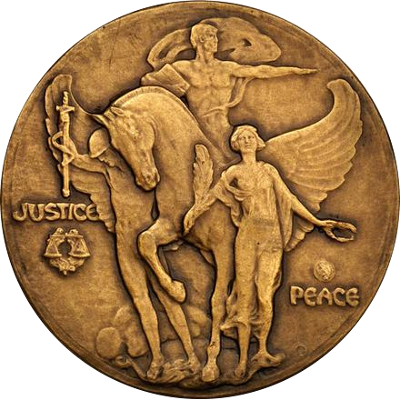
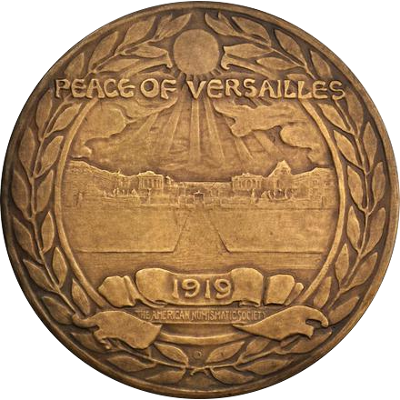
This medal was the 40th medal officially issued by the American Numismatic Society.
The obverse bears a male astride winged horse, accompanied on sides by personifications of Justice and Peace. To left, JUSTICE with scales and wreath; to right, PEACE with (ANS seal); signed at lower right, (C B monogram)
The reverse shows a view of the Palace of Versailles where the World War I peace treaty was signed. Wreath around circumference. Above, PEACE OF VERSAILLES; on ribbon, 1919; below, THE AMERICAN NUMISMATIC SOCIETY
The medal measures 63mm in diameter and was struck by the Medallic Art Company of New York. The reported mintage is 113 in silver and 318 in bronze.
Many thanks to Brian Holt for the images of the bronze medal.